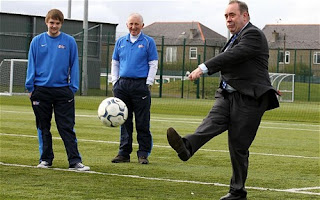By any reckoning, Richard Keen QC is an uncommonly political lawyer. Former Dean of the Faculty of Advocates, and now the UK government's chief adviser on Scots law, Ruth Davidson appointed him chairman of the Scottish Tories in 2013. While in office, he reportedly summoned the party's MSPs to his "small castle", and subjected them all to a dressing down for being useless. Some disgruntled parliamentarian, ungrateful for this advice, leaked the encounter to the media. This interlude seemed to do his political career no harm. When David Cameron secured his majority in 2015, and the Liberal Democrats were ejected from government, Keen took up Jim Wallace's vacant office of Advocate General for Scotland.
In that position, Keen appeared before the UK Supreme Court this morning, to speak to the devolved aspects of the ongoing Brexit case. We substantially knew what the Advocate General proposed to argue from his written argument, but the Justices afforded him an hour to expand on his points. We may hear from him again, in reply, after the Lord Advocate has made his submissions on behalf of the Scottish Government on Wednesday.
Keen's message to the Justices was characteristically trenchant and forthright -- but you have to wonder whether it was politically wise. Keen's argument is essentially a simple one. Parliament is sovereign. Nothing in the devolution settlements changes that. Indeed, the Scotland Act specifically recognises that Westminster retains competence over foreign affairs, including EU negotiations. It also retains power to legislate concerning devolved matters. Parliament is sovereign. It can make or unmake any law: the Scotland Act is no exception.
Where this gets controversial, however, is when we turn to the so-called "Sewel convention". Since 1998, Westminster has recognised that it will not legislate for devolved matters without the consent of Holyrood. What do we mean by devolved matters? Generally, this has been understood as (a) passing legislation which falls within Holyrood's powers, or (b) changing the legislative competence of Holyrood by adding or subtracting from its authority, by devolving more powers, or re-reserving powers which were once reserved.
But this convention gave Holyrood very limited legal protection. In states with codified and entrenched constitutions, the central government does not have the power to abolish regional parliaments, or to intrude on their competencies. The courts would block any attempt to do so. Some people wondered: why should Scotland be any different? Shouldn't the permanence and privileges of Holyrood also receive some legal protection?
In the wake of the 2014 independence referendum, the Smith Commission report agreed that"the Scottish Parliament will be made permanent in UK legislation" and that the Sewel convention should be "put on a statutory footing". Both of these commitments were reflected in sections one and two of the 2016 Scotland Act. But did these "constitutional protections" really make much difference? In the political domain, David Mundell and his colleagues made much of these concessions. The statutory recognition of Sewel and Holyrood's permanence were important, they said, meaningful.
That claim lies in ruins this afternoon, after Richard Keen's Supreme Court submissions. So what did he say? Characterising this statutory recognition of the convention as "a self-denying ordinance", Keen continued, it was only "a political restriction upon Parliament's ability to act, no more and no less than that" and in no sense any "qualification or inhibition upon parliamentary sovereignty."
This is all very well and good, you might well think, before 2016. From 1999 - 2016, Sewel was just a political convention. You didn't find it in any law. But surely the Scotland Act must make some kind of difference? Surely there was some point in including Sewel in the 2016 Act? If there wasn't, if the idea Westminster will not "normally legislate for devolved matters without consent" is just empty words, just hot political air, then why the devil did MPs do it?
The same thought struck Lord Sumption during the hearing. "But it cannot be described as a purely political force once it is enacted in a statute?" he asked. "Do you submit its incorporation as an Act of Parliament makes no difference to its legal effect?" he wondered.
Richard Keen's answer was consistent with the orthodox logic of his submission - but it remains politically stark. Yes, he said. The statutory recognition of Sewel is of no legal significance whatever. "The correct legal position", he concluded, is that Westminster "is sovereign, and may legislate at any time on any matter."As Graeme Cowie observed in the comments at the end of my last blog, "anyone paying even the most superficial of attention knew sections 1 and 2 of the Scotland Act 2016 were weasel words."
That may be true of constitutional scholars like Graeme. But for ordinary folk who followed the passage of the Scotland Act through Westminster and Holyrood, who listened to David Mundell's defence of its provisions -- Richard Keen's uncompromising submissions today may come as something of an unwelcome surprise.
That may be true of constitutional scholars like Graeme. But for ordinary folk who followed the passage of the Scotland Act through Westminster and Holyrood, who listened to David Mundell's defence of its provisions -- Richard Keen's uncompromising submissions today may come as something of an unwelcome surprise.












